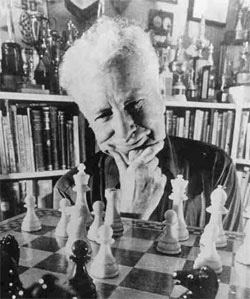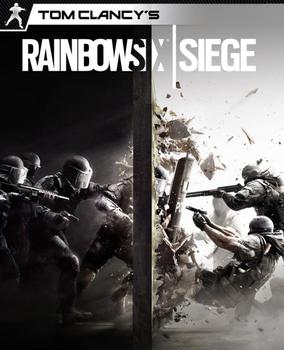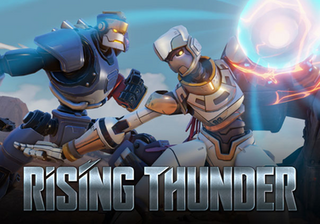Related Research Articles

The Elo rating system is a method for calculating the relative skill levels of players in zero-sum games such as chess or esports. It is named after its creator Arpad Elo, a Hungarian-American physics professor.
A ladder tournament is a form of tournament for games and sports. Unlike many tournaments, which usually have an element of elimination, ladder competitions can go on indefinitely. In a ladder competition, players are listed as if on the rungs of a ladder. The objective for a player is to reach the highest rung of the ladder.
A chess rating system is a system used in chess to estimate the strength of a player, based on their performance versus other players. They are used by organizations such as FIDE, the US Chess Federation, International Correspondence Chess Federation, and the English Chess Federation. Most of the systems are used to recalculate ratings after a tournament or match but some are used to recalculate ratings after individual games. Popular online chess sites such as Chess.com, Lichess, and Internet Chess Club also implement rating systems. In almost all systems, a higher number indicates a stronger player. In general, players' ratings go up if they perform better than expected and down if they perform worse than expected. The magnitude of the change depends on the rating of their opponents. The Elo rating system is currently the most widely used. The Elo-like ratings systems have been adopted in many other contexts, such as other games like Go, in online competitive gaming, and in dating apps.
Multiplayer online battle arena (MOBA) is a subgenre of strategy video games in which two teams of players compete against each other on a predefined battlefield. Each player controls a single character with a set of distinctive abilities that improve over the course of a game and which contribute to the team's overall strategy. The typical objective is for each team to destroy their opponents' main structure, located at the opposite corner of the battlefield. In some MOBA games, the objective can be defeating every player on the enemy team. Players are assisted by computer-controlled units that periodically spawn in groups and march forward along set paths toward their enemy's base, which is heavily guarded by defensive structures. This type of multiplayer online video games originated as a subgenre of real-time strategy, though MOBA players usually do not construct buildings or units. Moreover, there are examples of MOBA games that are not considered real-time strategy games, such as Smite (2014), and Paragon. The genre is seen as a fusion of real-time strategy, role-playing and action games.
In multiplayer video games, matchmaking is the process of connecting players together for online play sessions.

Awesomenauts was a multiplayer online battle arena (MOBA) video game developed by Dutch video game development company Ronimo Games. The game was released for PlayStation 3 and Xbox 360 consoles in May 2012, and for Microsoft Windows systems in August 2012. It was later ported to OS X and Linux. Another version of the game, Awesomenauts Assemble!, incorporating all the changes and additions available on Windows, OS X and Linux, was released for the PlayStation 4 in March 2014 and for the Xbox One in September 2016. In May 2017, the PC version of the game transitioned to a free-to-play title, incorporating an in-game currency and reward system to allow players to gain access to new characters and other customization aspects. In September 2019, Ronimo Games announced that development on the game has stopped indefinitely. Despite this, Awesomenauts was still available to play, until the servers went offline on September 15, 2023 due to Ronimo's bankruptcy.
Smite is a 2014 free-to-play, third-person multiplayer online battle arena (MOBA) video game developed and published by Hi-Rez Studios for Microsoft Windows, Xbox One, PlayStation 4, Nintendo Switch, and Amazon Luna. In Smite, players control a god, goddess or other mythological figure and take part in team-based combat, using their abilities and tactics against other player-controlled gods and non-player-controlled minions.

Heroes of the Storm is a crossover multiplayer online battle arena video game developed and published by Blizzard Entertainment. Announced at BlizzCon 2010, it was released on June 2, 2015 for macOS and Windows. The game features various characters from Blizzard's franchises as playable heroes, as well as different battlegrounds based on Warcraft, Diablo, StarCraft, and Overwatch universes.

Tom Clancy's Rainbow Six Siege is an online tactical shooter video game developed by Ubisoft Montreal and published by Ubisoft. It was released worldwide for PlayStation 4, Windows, and Xbox One on December 1, 2015; the game was also released for PlayStation 5 and Xbox Series X/S exactly five years later on December 1, 2020. The title also received a port for Google Stadia on June 30, 2021. The game puts heavy emphasis on environmental destruction and cooperation between players. Each player assumes control of an attacker or a defender in different gameplay modes such as rescuing a hostage, defusing a bomb, and taking control of an objective within a room. The title has no campaign but features a series of short, offline missions called, "situations" that can be played solo. These missions have a loose narrative, focusing on recruits going through training to prepare them for future encounters with the "White Masks", a terrorist group that threatens the safety of the world.

Vainglory is a free-to-play multiplayer online battle arena (MOBA) video game, developed and published by Super Evil Megacorp for iOS, Android and PC. As many games in its genre, Vainglory's gameplay focuses on player versus player battles, with players split into two teams of three or five with the ultimate goal of destroying the opposing team's base. The game was released for iOS on November 16, 2014, after being soft-launched for over half a year, with the Android version being released on July 2, 2015. A Mac and Microsoft Windows version of the game was released in July 2018. Through cross-platform play, players on all four platforms can play together simultaneously.

Rising Thunder was a cancelled free-to-play fighting game developed by Radiant Entertainment. Originally released in alpha state in 2015, the game closed following the acquisition of Radiant Entertainment by Riot Games. A freeware version of the game with available server source code, entitled Community Edition, was released in January 2018.
A hero shooter is a sub-genre of shooter games which emphasize "hero" characters that have distinctive abilities and/or weapons that are specific to them. A hero shooter can be a first-person shooter or a third-person shooter.

Paladins: Champions of the Realm is a 2018 free-to-play online hero shooter video game by Hi-Rez. The game was developed by Evil Mojo, an internal studio of Hi-Rez and was released on May 8, 2018, for Microsoft Windows, PlayStation 4, and Xbox One, followed by a Nintendo Switch version released on June 12, 2018.

Honor of Kings is a multiplayer online battle arena (MOBA) developed by TiMi Studio Group and published by Tencent Games for the iOS and Android mobile platforms.
Overwatch and Overwatch 2 are team-based first-person shooter games developed by Blizzard Entertainment. Overwatch was released in May 2016 for several platforms. The game features a number of gameplay modes that support casual play, ranked play, and competitive modes used for professional esports events, such as the Overwatch League. Overwatch 2 was released in October 2022 with the same player versus player (PvP) modes, and will later include new player versus environment (PvE) co-operative multiplayer modes.
Boosting is a method by which low-ranked players in online multiplayer games, such as first-person shooters and massively multiplayer online role-playing games (MMORPGs), hire more skilled players to artificially increase their gaming account rank or winning positions. Boosting is rarely allowed as part of a game's terms of service, and while legal in most countries, boosted accounts are sometimes banned or reset if detected. In South Korea, it was declared a criminal offense in 2018, leading various companies to tighten their policies on it. The act of boosting negatively impacts game balance by allowing unskilled players to lower the quality of high-ranking play, making the game less viable and enjoyable. However, the extent of the crackdown on boosting has been debated, with some calling it not severe enough to merit criminal penalties.

Overwatch is a multimedia franchise centered on a series of multiplayer first-person shooter (FPS) video games developed by Blizzard Entertainment. Overwatch was released in 2016 with a successor, Overwatch 2, released in 2022. Both games feature hero-based combat between two teams of players vying over various objectives, along with other traditional gameplay modes.
Skill-based matchmaking (SBMM), also referred to as matchmaking ranking, is a form of matchmaking dependent on the relative skill level of the players involved.
References
- ↑ Fenlon, Wes. "Want to be better at MOBAs? Stop complaining about ELO Hell". pcgamer. Retrieved 2017-08-19.
- ↑ "Riot talk LoL matchmaking and 'ELO Hell': most players guess their rating at "about 150 points higher" than reality". PCGamesN. Retrieved 2017-09-08.
- 1 2 "Tinder matchmaking is more like Warcraft than you might think - Kill Screen". Kill Screen. 2016-01-14. Archived from the original on 2017-08-19. Retrieved 2017-08-19.
- 1 2 "The Summoner's Guidebook: Getting out of Elo hell". Engadget. 11 May 2012. Retrieved 2017-08-19.
- 1 2 "League of Legends Ranked Queue is Once Again Getting Some Big Changes | Hardcore Gamer" . Retrieved 2017-08-19.
- ↑ "Want to play ranked in Dota 2? You'll need to give Valve your phone number". Destructoid. 21 April 2017. Retrieved 2017-08-19.
- ↑ Friedman, Daniel (2016-03-17). "League of Legends' biggest change in years is for the better". Polygon. Retrieved 2017-08-20.
- ↑ "Why I quit League of Legends". Esports News UK. 2017-07-08. Retrieved 2017-09-09.
- ↑ Grayson, Nathan. "Overwatch's Third Competitive Season Will Make Skill Ratings More Fair". Kotaku. Retrieved 2017-08-19.
- ↑ D'Anastasio, Cecilia. "Overwatch's Competitive Mode Is Depressing Right Now". Kotaku. Retrieved 2017-08-19.
- ↑ "Operation Solar Raid | Seasons | Tom Clancy's Rainbow Six Siege | Ubisoft (US)".
- ↑ "Rainbow Six Siege Ranked 2.0: New Emerald rank, MMR changes, and more". 25 November 2022.
- ↑ "Why is ranked matchmaking so damn awful?". 20 June 2023.